If you can forget the stuck-up aristocratic image of Poodles created by pop culture, you will find these dogs intelligent, athletic, and friendly. The bright attitude and people-pleasing nature of these dogs make them one of the best companions for us humans. These intelligent dogs can also be a peacekeeper among the other pets.
Breed Overview
- Group: Non-Sporting
- Weight: Toy Poodle: 5 to 9 pounds, Miniature Poodle: 15 to 18 pounds, Standard Poodle: 45 to 70 pounds
- Height: Toy Poodle: 24 – 28 cm, Miniature Poodle: 28 – 35 cm, Standard Poodle: 45 – 60cm
- Coat: Curly and dense single coats.
- Coat Color: Solid colours, including black, white, grey, apricot, and brown.
- Life Expectancy: 10-18 years.
The variation of sizes may be another reason for this dog breed’s vast popularity. Compared to others, the standard Poodles are more agile and athletic. They respond promptly to training. All in all, behind the impressive hair-do, regal demeanour, and blue ribbons, you can find a loving and affectionate family dog with many talents and a lengthy historical background.
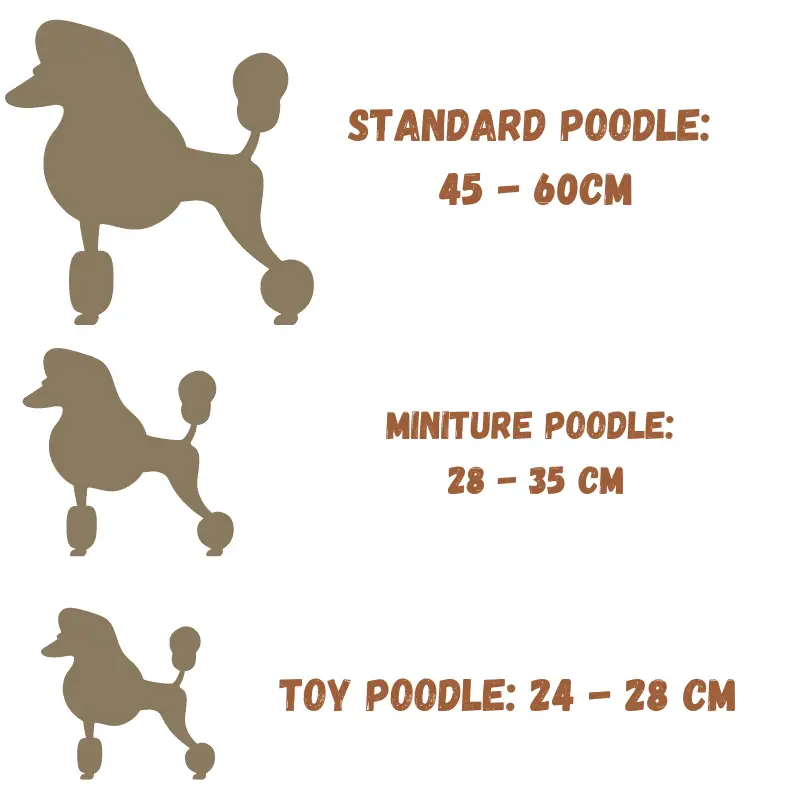
Personality
Poodles have a tremendous good sense of humour and are natural-born clowns. These people-pleasing dogs are friendly and love to mingle with people and other dogs. Always being the centre of attention to their owners makes these dogs proud and happy.
They also, surprisingly, can complete tasks that require both brain work and agility. Outwitting their human companions is common. Sometimes it might become a little annoying to live with a dog that can outsmart you.
Personality-wise, you can find many similarities among all three sizes. However, you can also spot a couple of behavioural differences among them.
It is not possible to spot these differences in every Poodle. But if you have enough experience handling Poodles of all three sizes, you may notice the characteristics below.
Active
The standard Poodles are energetic and very active. These dogs love to stay engaged. However, personality-wise, they are more reserved than a toy or miniature Poodles.
Unlike the standard Poodles, the miniature ones love to follow people around. Among all three sizes, the miniature Poodles are the most active ones.
Mischievous
Thanks to their unique size and energetic nature, Miniature Poodles are more suitable for children than Toy Poodles. The miniature poodles and the toy ones are more mischievous than the Standard Poodles. Toy Poodles are the best companion dogs. These intelligent dogs know how to do their job perfectly.
Intelligent
Even though Poodles are one of the most intelligent breeds, their intelligence is sometimes considered stubborn. Even then, these dogs can be trained as outstanding therapy dogs. Their intellectual, joyous nature and empathetic behaviour make them a natural candidate for therapy dogs.
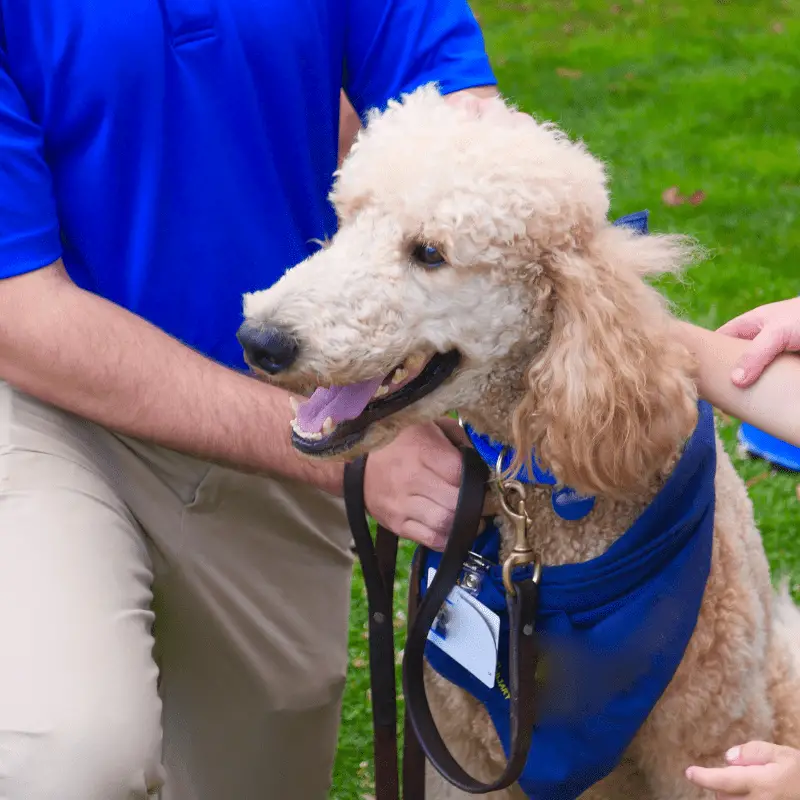
Poodles are often used for visiting people in schools, nursing homes, and hospitals. Working as a therapy dog also fixes the engagement requirements of the standard dogs.
Even though Poodles are active dogs, miniature toy poodles require less space and exercise. Miniature and Toy Poodles are considered the best companions for less active people who want a lap dog.
Trainable
Poodles are great learners and love showcasing their skills to their owners. That is what makes them such great show dogs. You can easily teach them to carry bottles to recycle bins, pick up newspapers and bring your slippers from the other room.
Loyal
These dogs love their owners and want to be involved in every one of their family activities. But whatever you do, you should never exclude your Poodle from family activities. Irrespective of their sizes, Poodles can’t stay alone for a long time. If you leave the dog alone for an extended period, they will channel their boredom into doing things that may not gain your approval.
Temperament
Poodles are intelligent, obedient, and playful dogs. Even though they are not an aggressive breed, they possess a watchdog tendency. Most people think Poodles are fragile thanks to their traditionally stylish haircuts and unique grooming routines.
The truth is, these dogs were bred for hunting ducks. That trait makes these dogs curious and alert to their surroundings, which makes them exceptional watchdogs. Poodles will bark to alert you about visitors or any other noises.
Young dogs and puppies would love to play, run and bounce around non-stop. Their activity level, however, tends to settle down with maturity. You can expect your Poodle to calm down by the time they become two years old. Also, the standard Poodles have a more calm demeanour than the toy and miniature ones.
Physical Description
Coat
Poodles come with a beautiful coat. It means you need to take special care of this coat to keep your dog healthy. The texture of the coat often ranges from wavy and soft to woolly and coarse. Like all other dogs, Poodles also shed their coats. However, instead of falling off them, the shredded hair gets tangled with the surrounding hair. If you do not take care of grooming, it can lead to matting pretty fast. You should also pay attention to the ears of the Poodles. The hair growth in the ear of these dogs often locks in moisture and accumulates ear wax leading to severe infections. You should remove the ear hair religiously to ensure that does not happen.
Colours
The Poodles come in a wide range of colouring. You can find these dogs in brown, black, grey, white, apricot, and cream colours. The coats of some dogs can show various shades of the same colour. This darker shade is generally noted in the ear featherings or the tips of the ruff.
- Apricot
- Black
- Black & White
- Blue
- Brown
- Cream
- Grey
- Red
- Sable
- Silver
- White
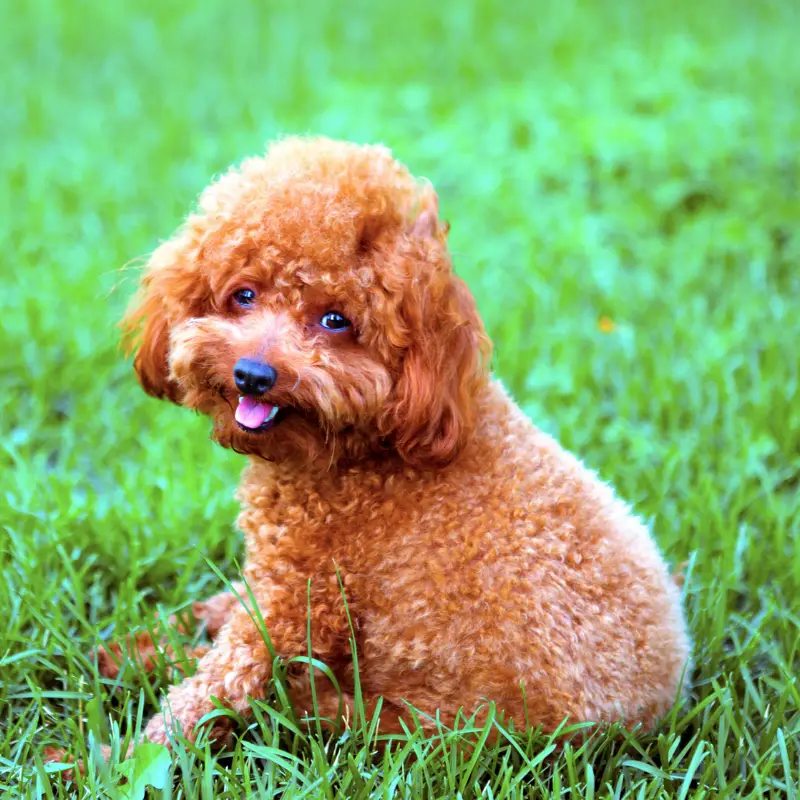
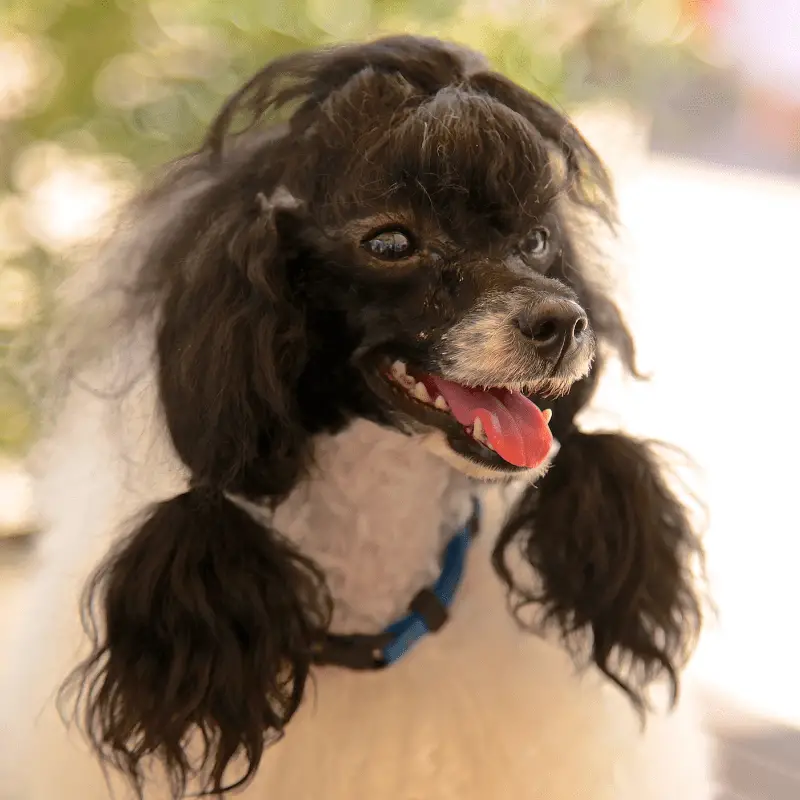

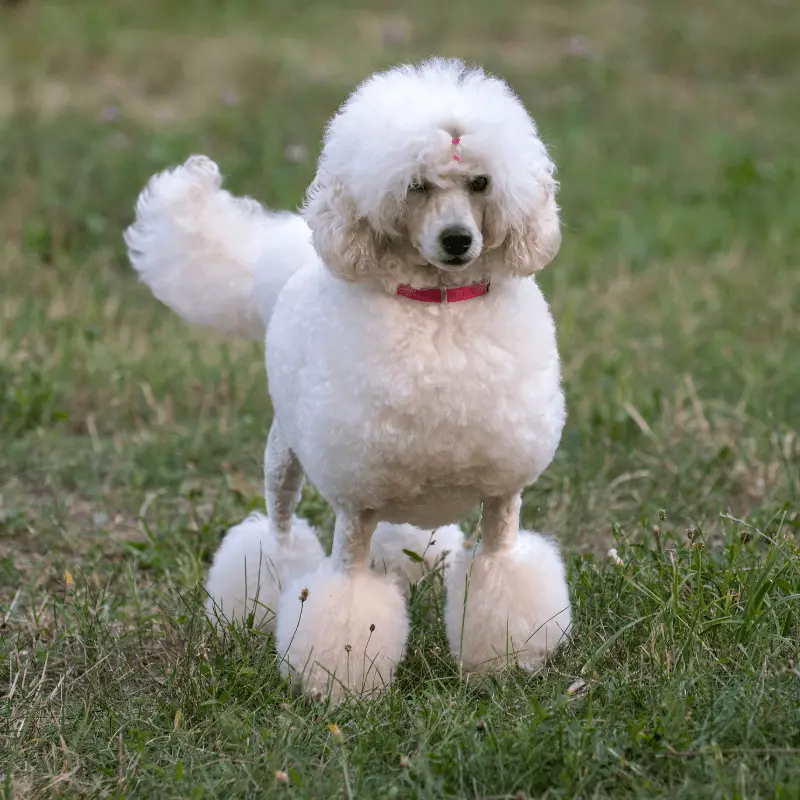
Even though the registries prefer clear and solid colours, natural variations of colour shades are not considered faulty. You can find brown Poodles with liver-coloured eye rims, noses, and lips. The apricot Poodles permit liver-coloured eye rims, noses, and lips. Still, these traits are not desirable. Most registries consider the incomplete colour of the eye rims, nose, and lips as faults.
The Phantom Poodles come in colourings that match the Doberman Pinscher. Partly coloured Poodles are considered the original colour of the Poodles. The partially coloured Poodles have more solid patches on a solid white coat. When the marking of the Poodles resembles a tuxedo, the dogs are called tuxedo Poodles.
Living Requirements
Poodles need a lot of exercise and chances of free movement and space. So, if you are thinking about getting a Poodle for yourself, you should ensure you have a lot of space in your home. If you do not have a backyard at your home, have plenty of time for playing and running outside in a park or nearby field. If you love to go camping, a Poodle can be your best companion. These dogs are naturally adventurous and love to swim. So, they make one of the best outdoor companions.
You can leave your pet Poodle alone, but try not to spend too much time away from home. These active companions thrive on your attention and the time they spend with the people they love. So, your prolonged absence can create separation anxiety in your dog.
Child-friendly
Poodles make the perfect pets for many different families, but they are especially great if you have children. Poodles will be an active mate to your kids and won’t hurt them because they are so gentle.
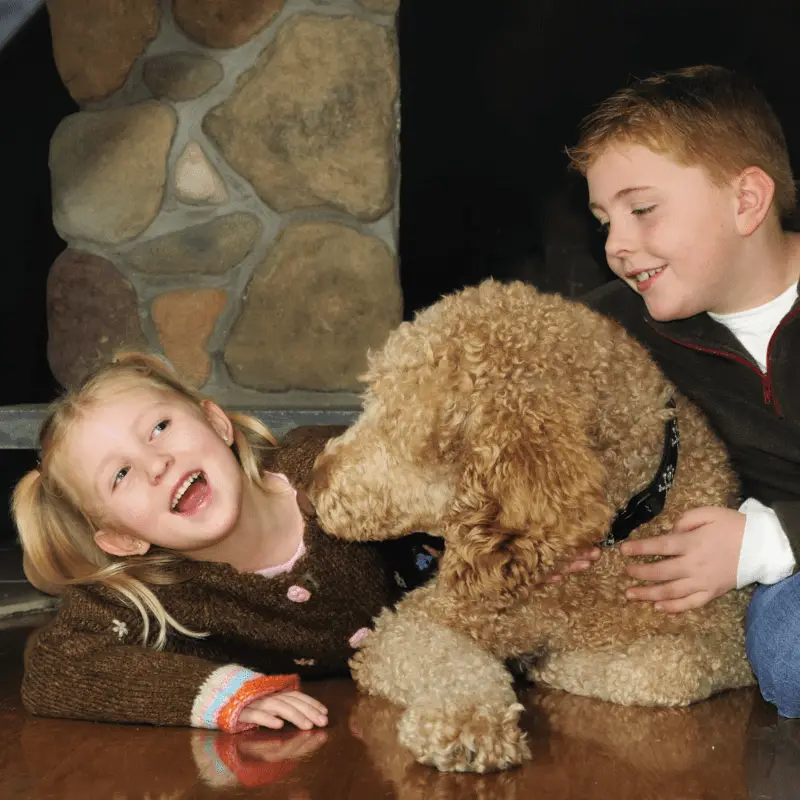
Always supervise your children and teach them how to behave while interacting with a dog.
Dog-friendly
Poodles are natural-born charmers that love to play with any dog they meet. They’ll go up and greet other dogs without a care, just wanting to chase after them or have fun!
History
Even though Poodles were believed to be of French origin for a long time, they have their roots in Germany. The dog’s name is derived from the German word pudel, which means to splash in the water.
The standard variety dogs are considered the oldest type of this breed. Their traditional role as retrievers and water dogs has led to their fashionable haircut. The Poodle haircuts were invented to protect the joints of the dogs from the cold temperatures of water. Poodles were often used to retrieve ducks and waterfowl from the water in hunting expeditions.
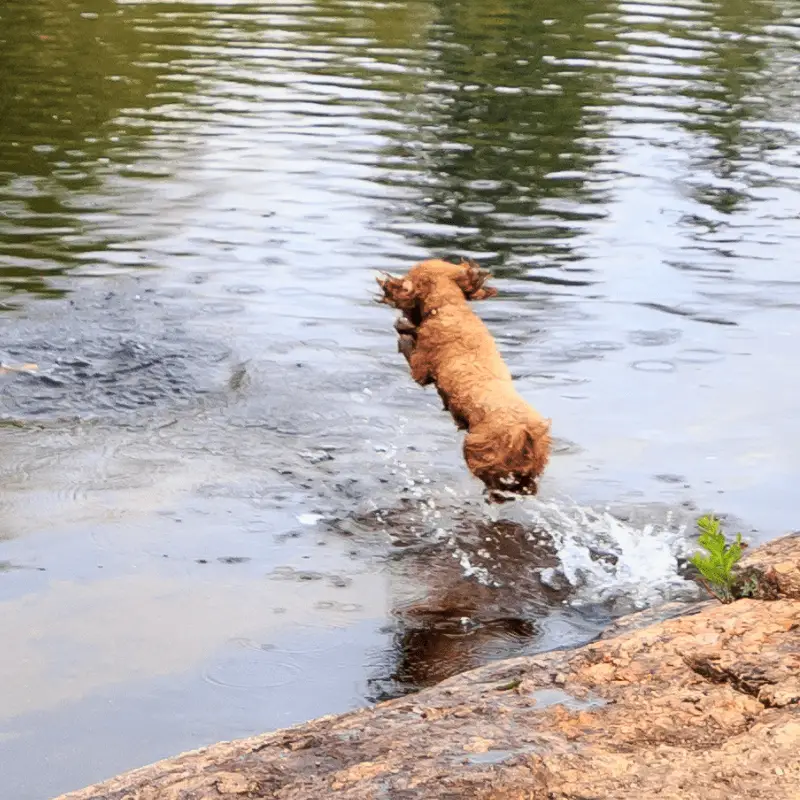
Even though miniature and toy variations of Poodles look fragile, they are also good hunters and swimmers. Poodles’ toys and miniature breeds were noted as the loved and pampered companions of the French aristocrats. Later on, these dogs also gained fame for their performing abilities. The Kennel Club of England Recognised Poodles in 1874. In 1886, the American Kennel Club also recognised these fluffy and energetic dog breeds.
Care
Poodles come with unique coats of hair that need regular maintenance. Their curly hair grows continuously. Periodic grooming and haircuts can help to retain the lustre of their fur. The coat of the Poodles comes in a single layer. But the shredded hair gets contained in the coat, which can lead to matting if not appropriately groomed. The coat under the Poodle’s eyes can develop tear stains as well.
The Poodle is considered a hypoallergenic dog breed depending on the coat type and shedding. While Poodles have allergens in their dander and saliva, they shed less. That is why these dogs are suitable for moderately and mildly allergic people. You have to spend considerable time around the Poodle to see if your allergies get triggered.
Trimming the Poodle’s nails every couple of weeks and maintaining rigorous dental hygiene is a good idea. Check your Poodle’s ears now and then to keep your pet away from ear infections.
Trainability
You can train the Poodles efficiently. These dogs can quickly pick up various tricks and do not require much motivation or rewards beyond regular treats. These dogs are natural learners, making the training sessions rewarding for both the owner and the dog. Compared to other dogs, house training is a breeze for the Poodles.
Once you can achieve the basic obedience, you can train your Poodle to complete the trick training, advance obedience training, and agility courses. These dogs are famous for their intelligence. They can pick up the teachings of these training sessions easily and can excel in agility competitions naturally. These dogs love to learn fast and want to please their trainers.
Tricks
Poodles love learning! Poodles are eager to learn tricks and commands, so don’t be shy not to try them out. I guarantee you’ll get a pleasant surprise when they quickly pick up on the trick.
Bark
Poodles crave attention and develop bad habits such as nuisance barking if they are ignored or left alone.
Instincts
The Standard Poodles are highly instinctual dogs. These dogs display an excessive tendency to mark their territory. That is why it is necessary to house train a Poodle right from the start of a puppy. The retriever instincts also make them respond aggressively to the animals they perceive as prey. That is why obedience training is necessary to keep these dogs calm when you take them outside.
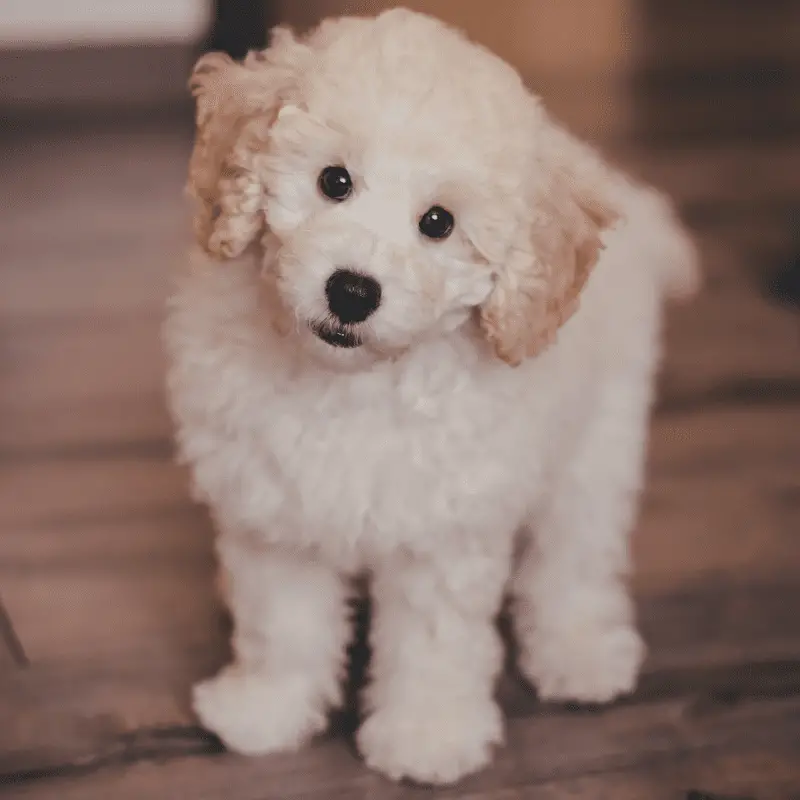
Health
While these energetic dogs are mostly healthy, some diseases affect the Poodles. Not all dogs will contract any or all of the health issues. But as an owner, it helps you take better care of them, knowing the possible health risks they could get.
Addison’s Disease
It is a severe condition that is triggered by insufficient adrenal hormones. Most dogs suffering from this problem have a poor appetite, lethargy, and vomiting. As these symptoms are not that specific, it is very natural to miss these signs and detect the problem when they reach the advanced stages. The condition can get even more severe if the potassium level interferes with the normal functions of the heart. In this case, your dog can go into extreme shock leading to its demise.
Gastric Dilation-Volvulus
Generally known as bloating, it is a life-threatening health problem for deep-chested dogs like Poodles. To prevent this problem, you should avoid feeding a dog a sizeable daily meal. Other than this, you should also avoid offering them large amounts of water. Ensure you do not exercise your dog vigorously after feeding them. Take your Poodle to the veterinary professionals if your dog has a distended abdomen.
Epilepsy
It is a problem that is quite common among Poodles. It is often inherited and can lead to severe to mild seizures. The seizures can cause unnatural behaviours, such as frantic running, hiding, or staggering. While witnessing dog seizures can be a frightening experience, the long prognosis of this health condition is surprisingly good. You must remember that seizures can occur due to various factors other than epilepsy. So, the moment you notice that your dog is having an attack, you should get in touch with a veterinary professional immediately.
